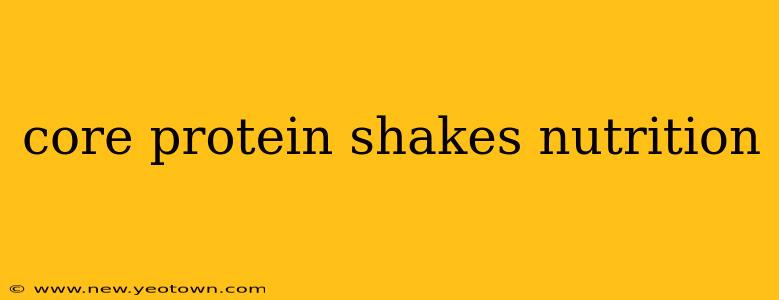Protein shakes have exploded in popularity, becoming a staple for athletes, fitness enthusiasts, and anyone looking to boost their protein intake. But with countless brands and formulas on the market, choosing the right one can feel overwhelming. This article dives deep into the nutritional aspects of core protein shakes, exploring their benefits, ingredients, and how to choose the best one for your individual needs. Let's unravel the science behind this convenient and effective way to enhance your health and fitness goals.
What are the key ingredients in a core protein shake?
The foundation of any good protein shake is, unsurprisingly, the protein source itself. This is usually whey protein, casein protein, soy protein, or a blend. Whey, a byproduct of cheese-making, is a fast-digesting protein, ideal for post-workout recovery. Casein, also from milk, digests more slowly, providing a sustained release of amino acids throughout the night. Soy protein is a plant-based option, popular with vegetarians and vegans. Many core protein shakes blend different protein sources to leverage the benefits of each. Beyond the protein, you'll often find added ingredients like carbohydrates (for energy), healthy fats (for satiety and hormone regulation), and various vitamins and minerals to enhance the nutritional profile. Look for shakes with minimal added sugars and artificial ingredients.
What are the health benefits of core protein shakes?
The benefits of incorporating a core protein shake into your diet are multifold. First and foremost, they provide a convenient and efficient way to meet your daily protein requirements. Protein is crucial for building and repairing muscle tissue, supporting a healthy immune system, and maintaining overall bodily functions. For individuals with busy schedules or those struggling to consume enough protein through whole foods alone, protein shakes offer a valuable solution. Moreover, depending on the specific formulation, they can also contribute to increased satiety, helping with weight management. The added carbohydrates and fats can provide sustained energy throughout the day, particularly beneficial for athletes or individuals engaging in strenuous physical activity.
How many calories are in a typical core protein shake?
The calorie content of a core protein shake varies significantly depending on the brand, the type of protein used, and any added ingredients. A typical serving might range from 150 to 300 calories, with the majority of these calories coming from protein. However, added sugars, fats, and carbohydrates can significantly increase the calorie count. Always check the nutrition label to determine the exact calorie content of your chosen shake.
Are core protein shakes good for weight loss?
Core protein shakes can be a helpful tool in a weight loss strategy, but they are not a magic bullet. High-protein diets can promote satiety, leading to reduced overall calorie intake. Furthermore, protein has a higher thermic effect than carbohydrates or fats, meaning your body burns more calories digesting it. However, it's crucial to remember that the effectiveness of protein shakes for weight loss depends on overall diet and exercise habits. Choosing shakes with lower sugar content and incorporating them into a balanced, calorie-controlled diet is essential for achieving weight loss goals. Relying solely on protein shakes for weight loss is not recommended and might even be counterproductive.
What are the potential side effects of core protein shakes?
While generally safe for consumption, some individuals may experience side effects from core protein shakes. These can include digestive issues like bloating, gas, or diarrhea, particularly with whey protein. Individuals with lactose intolerance should opt for lactose-free or plant-based protein sources. Excessive protein intake can also strain the kidneys, although this is more of a concern for individuals with pre-existing kidney conditions. Finally, be mindful of added sugars and artificial ingredients; excess sugar can lead to weight gain and other health problems. It's always best to consult with a healthcare professional or registered dietitian before making significant changes to your diet, particularly if you have underlying health concerns.
Choosing the Right Core Protein Shake for You
Navigating the world of protein shakes requires a thoughtful approach. Consider your dietary needs, fitness goals, and any allergies or intolerances. Look for shakes that are low in added sugars and artificial ingredients, prioritizing whole-food-based ingredients whenever possible. Pay close attention to the protein source and its digestibility, selecting a blend or single source that aligns with your daily routine and activity levels. Remember, a core protein shake is a supplement, not a replacement for a balanced diet and regular exercise. Use it strategically to support your overall health and wellness journey.

